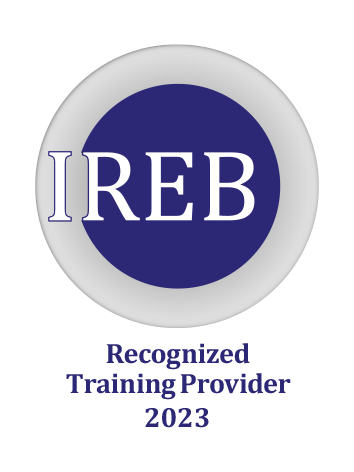The International Requirements Engineering Board (IREB) is an international nonprofit organization that focuses on the further professionalization of the Requirements discipline. (Equivalent to ISTQB in testing.) Within IREB are requirements engineering experts like Chris Rupp and Suzanne Robertson member of the international board.
Meanwhile IREB developed a certification program for Requirement Engineering (CPRE). The internationally recognized examinations are conducted by the International Software Quality Institute (iSQI).
The curriculum has three levels: Foundation Certificate, Advanced Certificate and Expert Certificate
This three-day accredited course is a preparation for the exam "Certified Professional for Requirements Engineering - Advanced Level, Elicitat ion and Consolidation" and meets the requirements as set down by IREB. The focus is set on acquiring and developing advanced requirements engineering topics in the area of: requirements sources, elicitation techniques, consolidation techniques and communication. In addition to the theoretical foundations, the course places great emphasis on practical exercises. Hence, practical components account for roughly half the course timetable.
The certification itself consists of two parts and is optional. The written examination, which is the first part of the certification, is held during the afternoon of the third day. For those who are not taking part in the examination, the instructor will be available during this period in order to clarify any questions and to go into more detail about the course content. The second part of the certification involves the implementation of the taught course content in the form of a practical assignment. This part is not included in the actual course and is conducted by an independent examiner.

The overall objective of this course is to improve knowledge and gain practical skills in Advanced Requirement Engineering and Requirements Management.
Each participant will be faced with following specific targets:
The course is aimed at participants who already have theoretical knowledge and practical experience of Requirements Engineering:
Candidates for the CPRE Advanced Level module examination must already have received the CPRE Foundation Level certificate.
Throughout the course, an accredited trainer and requirements engineering expert provides lectures and gives exercises based on real world projects.
Different mock exams ensure an optimal preparation for the real certification exam.
Courses can be given in English or in Dutch. Course material is in English.
The course and the exam are offered in cooperation with our partner Improve QS.
The course duration is 3 days.
The exam (optional) is organised at the end of the 3rd day.
Exams are available in English, Dutch or French.
This course can be given at the client’s site or at CTG.
Pricing
€ 1.950/ 3 days, per person.
All prices are exclusive of the exam fee, which is subject to change. At the time of publishing the exam fee is € 600 per person. All prices are VAT excluded; course material, lunch and beverages included.
Cancellation
Course Logistics
All classroom courses begin promptly at 9 am and are scheduled until 5 pm. All courses are organised at the CTG premises in Diegem (Belgium).
All courses can be given at the client site and are available for groups as well. Please contact us if you wish further information.
The standard language of each course is English.
* Prices subject to VATKnowledge of requirement sources
Requirement sources
Knowledge and application of elicitation techniques
Survey, observation and creativity techniques for requirements elicitation
Communication for requirements engineering
Recognizing conflicts and finding solutions
Knowledge and application of various consolidation techniques
Exam (optional)
CTG Belgium NV
Culliganlaan 1D
1831 DIEGEM
Belgium
phone: +32 2 720 51 70
fax: +32 2 725 09 20
Buffalo,New York
300 Corporate Parkway
Suite 214N
Amherst, NY 14226
phone: +1 716 882 8000
fax: +1 716 887 7464